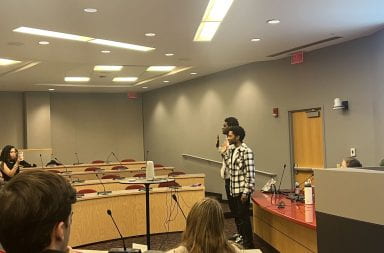Muslim speaker Tarek Fatah came to Hitchcock Hall Tuesday to discuss his book “The Jew Is Not My Enemy” and left many students divided.
The Schottenstein Chabad House at OSU, a Jewish student organization, planned the event titled “Unveiling the Myths that Fuel Muslim Anti-Semitism.”
Sarah Deitsch, a campus program leader, and her husband, Rabbi Zalman Deitsch of the Chabad House, made the decision to have Fatah come speak to students.
Sarah said the decision to bring in a Muslim speaker instead of a Jewish speaker was intentional. She stressed the need to raise awareness among students of the issues that create divisions between Jews and Muslims.
The Chabad House reached out to other non-Jewish groups on campus for support and sponsorship. The student organizations Buckeyes for Israel and the North African Students were both sponsors for the event.
Chabad House also asked the Muslim Students’ Association at OSU to help sponsor the event, but it declined.
Maria Ahmad, president of the Muslim Students’ Association, disagreed with the Chabad House’s selection of Fatah as a Muslim speaker on anti-Semitism because she believes the dialogue would be rooted in his misrepresentation of Islam.
“Islam does not teach that anyone, regardless of religion, class, sexual orientation or anything, is the enemy of any Muslim. Islam in fact teaches that the only enemy of a believer is Satan because he causes disrupt between humans. The title of Tarek Fatah’s book, however, seems to imply that Muslims are taught that the Jew is the enemy,” Ahmad said. “His tone makes it seem as though there is something in the Quran to apologize for and we (the Muslim Students’ Association at OSU) reject the fact that intolerance is inherent in Islam to begin with.”
The Chabad House does not believe that Fatah suggests intolerance is inherent in Islam, Sarah said.
Fatah made clear during his speech that, “it is imperative that Americans understand the forces of Islamism as distinct from Islam: one as a political ideology, one as a faith,” she said.
Fatah covered topics such as the two-state solution to bring peace between Israel and Palestine and stressed that faith should never be a reason to attack any group.
He stressed the need for Muslims and Jews to ask each other questions.
Fatah said Jews should ask, “Do you recognize us as a people?” to Muslims, and Muslims should ask, “Do you recognize my faith as original?” to Jews. Only if the answer is “yes” on both sides can the problems of Muslim anti-Semitism and religious discord be changed on both sides, Fatah said.
A majority of students who attended the event identified themselves as Jews. However, students from numerous faiths and beliefs were present.
Some students felt personally attacked by generalizations; others had no issue with Fatah and felt he created positive dialogue.
“I came out of curiosity,” said Haroun Dada, a second-year in biology. “I thought, maybe good things will come out of (the event). But, I want to talk to USG and the multicultural center because the entire event was him making sweeping generalizations and I felt attacked. He has no right to do that. How could you endorse an event that doesn’t bridge anything, and creates fear?”
Jeff Benatar, a fourth-year in jazz studies, thought the event was productive and said students who felt attacked by the event should “take everything with a grain of salt.”
“You are brought up a certain way,” Benatar said. “We have to decide what is fact or fable.”
Cristina Martinez, a graduate student in English, said, “Honest opinion: This guy is disgusting. The way he responded to one of the girls’ questions, it did not reflect the freedoms he was preaching about with democracy.”
Martinez left the auditorium to wait for friends.
If confronted by a student who was upset by the event, “I would want to meet with the student first and provide an apology or so on, but would have to meet first to understand why they felt upset,” said Cameron Deschenes, a second-year in international studies and president of Buckeyes for Israel.


